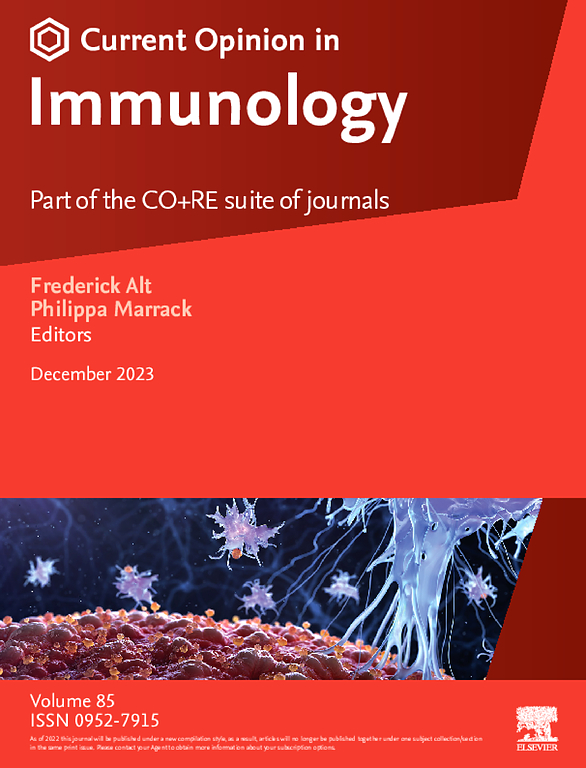Deciphering and harnessing gut microbiota–associated immune regulation in acute graft-versus-host disease
IF 5.8
2区 医学
Q1 IMMUNOLOGY
引用次数: 0
Abstract
Allogeneic hematopoietic stem cell transplantation represents a curative treatment of choice for numerous severe hematological malignancies. While donor-derived transplanted T cells can limit disease relapse (GvT/GvL effect), they also induce, in 30–50% of the patients, acute graft-versus-host disease (aGvHD), a severe condition with elevated mortality and comorbidity rates. Gut microbiota composition has been associated with aGvHD outcome. This observation created a substantial research interest, and individual gut microbiota commensals have been acknowledged for their ability to promote immune regulation, both locally and systemically, and thus limit aGvHD-related inflammation. The mechanisms by which commensals support immune homeostasis are being decrypted at a remarkable rate. However, the trillions of micro-organisms comprising the gut microbiome interact, both directly and indirectly, with local immune cells, which is all the more critical in the context of heavy conditioning regimens these patients undergo, themselves damaging mucosal tissues and prompting inflammation. Commensals can help preserve the gut barrier integrity by actively limiting deleterious inflammation processes. Mechanistically deciphering the intricate crosstalk between gut microbes and gut immune cells, both at the species level and globally, represents a colossal challenge, but holds great promise in predicting and harnessing numerous pathological processes, including aGvHD. This review aims to examine the acquired knowledge concerning immunoregulatory responses driven by gut microbiota in the context of aGvHD. Recent preclinical and clinical studies harnessing such pathways proved to be encouraging, while substantial hurdles subsist regarding how to successfully harness this complex host/microbiota interplay to constrain aGvHD.
在急性移植物抗宿主病中破译和利用肠道微生物群相关的免疫调节
同种异体造血干细胞移植是治疗许多严重血液系统恶性肿瘤的一种选择。虽然供体来源的移植T细胞可以限制疾病复发(GvT/GvL效应),但它们也会在30-50%的患者中诱发急性移植物抗宿主病(aGvHD),这是一种死亡率和合并症发生率升高的严重疾病。肠道菌群组成与aGvHD的预后有关。这一观察结果引起了大量的研究兴趣,并且个体肠道微生物群共生体因其促进局部和全身免疫调节的能力而得到承认,从而限制了agvhd相关的炎症。共生体支持免疫稳态的机制正在以惊人的速度被解密。然而,组成肠道微生物组的数万亿微生物直接或间接地与局部免疫细胞相互作用,这在这些患者接受大量调理方案的背景下更为关键,它们本身会损害粘膜组织并引发炎症。共生菌可以通过积极地限制有害的炎症过程来帮助保持肠道屏障的完整性。在物种水平和全球范围内,从机制上破译肠道微生物和肠道免疫细胞之间复杂的串扰是一个巨大的挑战,但在预测和利用包括aGvHD在内的许多病理过程方面具有很大的希望。本综述旨在研究在aGvHD背景下肠道微生物群驱动的免疫调节反应的相关知识。最近利用这些途径的临床前和临床研究被证明是令人鼓舞的,然而在如何成功利用这种复杂的宿主/微生物群相互作用来限制aGvHD方面存在实质性障碍。
本文章由计算机程序翻译,如有差异,请以英文原文为准。
求助全文
约1分钟内获得全文
求助全文
来源期刊
CiteScore
13.30
自引率
1.40%
发文量
94
审稿时长
67 days
期刊介绍:
Current Opinion in Immunology aims to stimulate scientifically grounded, interdisciplinary, multi-scale debate and exchange of ideas. It contains polished, concise and timely reviews and opinions, with particular emphasis on those articles published in the past two years. In addition to describing recent trends, the authors are encouraged to give their subjective opinion of the topics discussed.
In Current Opinion in Immunology we help the reader by providing in a systematic manner: 1. The views of experts on current advances in their field in a clear and readable form. 2. Evaluations of the most interesting papers, annotated by experts, from the great wealth of original publications.
Current Opinion in Immunology will serve as an invaluable source of information for researchers, lecturers, teachers, professionals, policy makers and students.
Current Opinion in Immunology builds on Elsevier''s reputation for excellence in scientific publishing and long-standing commitment to communicating reproducible biomedical research targeted at improving human health. It is a companion to the new Gold Open Access journal Current Research in Immunology and is part of the Current Opinion and Research(CO+RE) suite of journals. All CO+RE journals leverage the Current Opinion legacy-of editorial excellence, high-impact, and global reach-to ensure they are a widely read resource that is integral to scientists'' workflow.

 求助内容:
求助内容: 应助结果提醒方式:
应助结果提醒方式:


